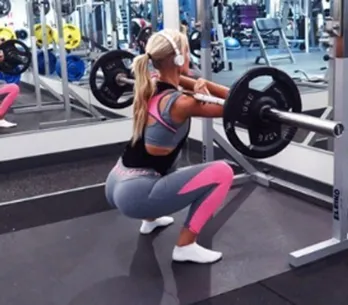1. Increase your base metabolism.
Your base metabolism is what the body burns while at rest (the energy required for cell renewal, heartbeat, breathing and muscle maintenance). It varies considerably from one person to the next, according to age, size and sex, among other factors. Anyone can increase their metabolism, by:
Developing muscle mass.
Unlike fat, muscle remains active at rest. The maintenance of contractive tissue consumes a lot of energy. The state of minimal muscle contraction called ‘tone’ also requires a significant amount of calories. This is why it's best to combine weight training with endurance exercise if you want to increase your base metabolism.
Eating.
All the processes involved in digestion use the body and demand energy. This explains in part the fact that people who eat 4 to 5 small meals a day rather than 3 big ones are usually thinner. So a snack at 11am and 4pm, providing it is a healthy one (fruit or dairy, for example) is a good idea.
Choosing the right foods
Digesting protein (meat, fish and eggs) uses a significant amount of energy as protein maintains muscle mass (20-25 calories per 100g compared to 3 calories for fat and 5 calories for carbs). Some stimulants also increase energy use: each cup of coffee you drink, for example, increases energy use by about 15% in the hours after drinking it. Finally, raw and cold food which is more difficult to digest also requires extra effort from the body.
Exposure to varied temperatures
Human cells only live for a long time in temperatures between 36 and 41°C. When exposed to cold and hot climates, the body naturally burns calories to keep its internal temperature stable in spite of external variations.
Stress
In some people, high stress increases energy combustion...but stress is linked to weight gain for many people, so don't seek it out!
Sleep
It’s proven: lack of sleep makes you put on weight! When we sleep the body starts a process of cellular regeneration that involves calorie combustion.
2. Activity
From walking to the shops to buy milk to hoovering, all activity (however small) burns calories. Here are some examples:
Stacking wood for 2 hours = 720 calories
Digging for 1 hour = 500 calories
Mowing the lawn for 30 mins = 300 calories
Painting the shutters for 1 hour and a half = 450 calories
Shopping for 3 hours = 641 calories
Passionate lovemaking for 30 mins = 250 calories
Climbing the stairs for 15 mins = 130 calories
Hoovering for 30 mins = 150 calories
Washing the floor with a cloth = 130 calories
Ironing for 1 hour = 130 calories
Moving furniture around for 45 mins = 280 calories
Walking everyday = between 180 and 250 calories per hour
3. Sport
Skiing = from 500 to 750 calories per hour
Rollerblading = between 500 and 750 calories per hour
Jogging = around 550 calories per hour
Racket sports (badminton, tennis, squash) = 500 calories per hour
Fitness (step, aerobics) = from 300 to 600 calories per hour
Cycling = from 300 to 600 calories per hour depending on the speed, terrain and weather conditions.
Swimming = 300 calories per hour













